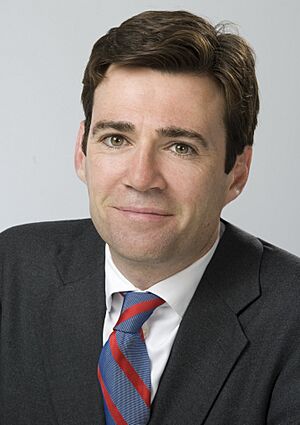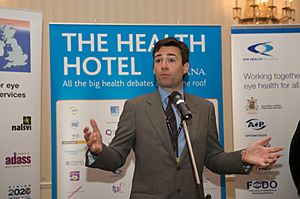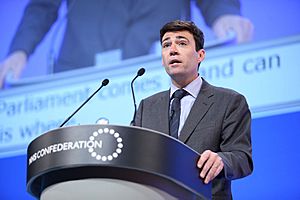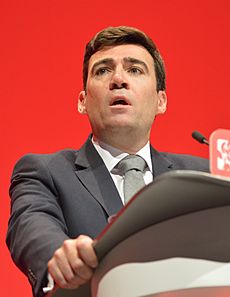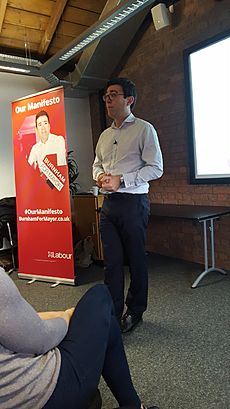Andy Burnham facts for kids
Quick facts for kids
Andy Burnham
|
|||||||||||||||||||||||||||||||||||||||||||
|---|---|---|---|---|---|---|---|---|---|---|---|---|---|---|---|---|---|---|---|---|---|---|---|---|---|---|---|---|---|---|---|---|---|---|---|---|---|---|---|---|---|---|---|
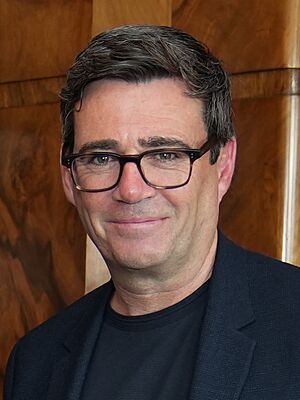
Burnham in 2024
|
|||||||||||||||||||||||||||||||||||||||||||
| Mayor of Greater Manchester | |||||||||||||||||||||||||||||||||||||||||||
| Assumed office 8 May 2017 |
|||||||||||||||||||||||||||||||||||||||||||
| Deputy |
|
||||||||||||||||||||||||||||||||||||||||||
| Preceded by | Tony Lloyd (interim) | ||||||||||||||||||||||||||||||||||||||||||
| Secretary of State for Health | |||||||||||||||||||||||||||||||||||||||||||
| In office 5 June 2009 – 11 May 2010 |
|||||||||||||||||||||||||||||||||||||||||||
| Prime Minister | Gordon Brown | ||||||||||||||||||||||||||||||||||||||||||
| Preceded by | Alan Johnson | ||||||||||||||||||||||||||||||||||||||||||
| Succeeded by | Andrew Lansley | ||||||||||||||||||||||||||||||||||||||||||
| Secretary of State for Culture, Media and Sport | |||||||||||||||||||||||||||||||||||||||||||
| In office 24 January 2008 – 5 June 2009 |
|||||||||||||||||||||||||||||||||||||||||||
| Prime Minister | Gordon Brown | ||||||||||||||||||||||||||||||||||||||||||
| Preceded by | James Purnell | ||||||||||||||||||||||||||||||||||||||||||
| Succeeded by | Ben Bradshaw | ||||||||||||||||||||||||||||||||||||||||||
| Chief Secretary to the Treasury | |||||||||||||||||||||||||||||||||||||||||||
| In office 28 June 2007 – 24 January 2008 |
|||||||||||||||||||||||||||||||||||||||||||
| Prime Minister | Gordon Brown | ||||||||||||||||||||||||||||||||||||||||||
| Preceded by | Stephen Timms | ||||||||||||||||||||||||||||||||||||||||||
| Succeeded by | Yvette Cooper | ||||||||||||||||||||||||||||||||||||||||||
|
|||||||||||||||||||||||||||||||||||||||||||
|
|||||||||||||||||||||||||||||||||||||||||||
| Member of Parliament for Leigh |
|||||||||||||||||||||||||||||||||||||||||||
| In office 7 June 2001 – 3 May 2017 |
|||||||||||||||||||||||||||||||||||||||||||
| Preceded by | Lawrence Cunliffe | ||||||||||||||||||||||||||||||||||||||||||
| Succeeded by | Jo Platt | ||||||||||||||||||||||||||||||||||||||||||
| Personal details | |||||||||||||||||||||||||||||||||||||||||||
| Born |
Andrew Murray Burnham
7 January 1970 Aintree, Lancashire, England |
||||||||||||||||||||||||||||||||||||||||||
| Political party | Labour Co-op | ||||||||||||||||||||||||||||||||||||||||||
| Spouse | Marie-France van Heel | ||||||||||||||||||||||||||||||||||||||||||
| Children | 3 | ||||||||||||||||||||||||||||||||||||||||||
| Alma mater | St Aelred's Catholic High School University of Cambridge |
||||||||||||||||||||||||||||||||||||||||||
| Signature | |||||||||||||||||||||||||||||||||||||||||||
| Top - 0-9 A B C D E F G H I J K L M N O P Q R S T U V W X Y Z |
Andrew Murray Burnham (born 7 January 1970) is a British politician. He has been the Mayor of Greater Manchester since 2017. Before becoming mayor, he held important roles in the UK government. He was a Cabinet minister under Prime Minister Gordon Brown. His roles included Chief Secretary to the Treasury (2007–2008), Culture Secretary (2008–2009), and Health Secretary (2009–2010).
Burnham is a member of the Labour Co-op and identifies as a socialist. He was also a Member of Parliament (MP) for Leigh from 2001 to 2017. He served as Shadow Home Secretary from 2015 to 2016, which means he was the main spokesperson for his party on home affairs when they were not in power.
Early Life and Education
Andrew Murray Burnham was born on 7 January 1970 in Aintree, which is now part of Liverpool City Region, Merseyside. His father was a telephone engineer, and his mother was a receptionist. He grew up in Culcheth and went to St Lewis Catholic Primary School. He then attended St Aelred's Roman Catholic High School in Newton-le-Willows.
Burnham later studied English at the University of Cambridge, where he was a student at Fitzwilliam College, Cambridge. He has said that his Catholic upbringing influenced his political views.
Political Career
Burnham joined the Labour Party when he was 15 years old. He worked as a researcher for politician Tessa Jowell from 1994 to 1997. After that, he worked for the NHS Confederation, which represents healthcare organizations, and then for the Football Task Force.
From 1998 to 2001, he was a special adviser to Chris Smith, who was the Secretary of State for Culture, Media and Sport. This role involved giving advice to a government minister.
Becoming a Member of Parliament
In 2001, after the local MP Lawrence Cunliffe retired, Andy Burnham was chosen to be the Labour candidate for Leigh. Leigh was a safe Labour seat, meaning it was very likely a Labour candidate would win.
Burnham was elected as an MP in the 2001 election with a large majority. He gave his first speech in the House of Commons on 4 July 2001. As an MP, he was part of the Health Select Committee from 2001 to 2003. He then became a Parliamentary Private Secretary (PPS) to senior ministers, which is a junior role helping a minister.
Working in Government (2005–2010)
After the 2005 election, Prime Minister Tony Blair promoted Burnham to a junior government role as a Parliamentary Under Secretary of State at the Home Office. In 2006, he became a Minister of State for Health, focusing on how health services were delivered.
When Gordon Brown became Prime Minister in 2007, Burnham was promoted to the Cabinet. He became Chief Secretary to the Treasury, a senior role in the government's finance department. He held this position until 2008.
Cabinet Minister Roles (2008–2010)
In January 2008, Burnham became Secretary of State for Culture, Media and Sport. In this role, he worked on policies related to arts, sports, and media. He also spoke about supporting the music industry.
In April 2009, after being at the 20th anniversary of the Hillsborough disaster, Burnham asked Prime Minister Gordon Brown to discuss the tragedy in Parliament. This led to a new investigation into the disaster. In 2014, when he spoke at the 25th anniversary, he was praised by the crowd.
In June 2009, Burnham was promoted again to Secretary of State for Health. He was responsible for the National Health Service (NHS). During his time, he responded to the 2009 swine flu pandemic. He also started an independent inquiry into serious issues at Stafford Hospital. This inquiry found problems with care at the hospital.
In Opposition (2010–2017)
After the Labour Party lost the 2010 general election, Burnham became the Shadow Secretary of State for Health. This meant he was the main spokesperson for health for the Labour Party while they were not in power.
First Leadership Campaign (2010)
Following Gordon Brown's resignation as Labour leader, Burnham ran in the leadership contest in May 2010. He focused on ideas like "aspirational socialism" and creating a national care service. He finished fourth in the contest, which was won by Ed Miliband.
Shadow Cabinet Roles (2010–2015)
In October 2010, Ed Miliband appointed Burnham as Shadow Secretary of State for Education. In this role, he spoke out against the government's plans for "free schools" and supported a more traditional school system.
A year later, he returned to the role of Shadow Secretary of State for Health, which he held until 2015.
Second Leadership Campaign (2015)
After Labour lost the 2015 general election, Ed Miliband resigned as leader. On 13 May 2015, Burnham announced he would run again in the leadership election. He aimed to bring the party and country together.
He finished second in the election, behind Jeremy Corbyn.
Shadow Home Secretary (2015–2017)
In September 2015, Burnham became Shadow Home Secretary in Jeremy Corbyn's team. This meant he was the main Labour spokesperson on issues like policing and security.
On 27 April 2016, after the Hillsborough inquest found that the 96 deaths were unlawful killings, Burnham gave a powerful speech in the House of Commons. He called for those responsible to be held accountable and criticized the police force involved. His speech received applause from MPs, which is unusual in Parliament.
As his final act in Parliament on 25 April 2017, he led a debate on the Contaminated Blood Scandal. He presented evidence and called for an investigation into the serious issues surrounding the scandal.
Mayor of Greater Manchester (2017–present)
Becoming Mayor
In May 2016, Andy Burnham confirmed he would run for the new role of Mayor of Greater Manchester. He was chosen as the Labour candidate in August 2016. He then stepped down as Shadow Home Secretary and as an MP to focus on his mayoral campaign.
Burnham was elected as the first mayor of Greater Manchester on 5 May 2017. He won with 63% of the vote across all ten boroughs of Greater Manchester. In his victory speech, he said that politics had been too focused on London and that Greater Manchester would now take more control.
He was re-elected as mayor in May 2021 with 67% of the vote. In May 2024, he was elected for a third term with 63.4% of the vote. This was the first Greater Manchester Mayoral election to use the first-past-the-post system, where the candidate with the most votes wins.
Key Focus Areas as Mayor
One of Burnham's main goals as mayor was to tackle homelessness in Greater Manchester. He promised to donate 15% of his mayoral salary to charities helping homeless people. He aimed to end rough sleeping by 2020, though he later admitted this target would be missed.
Public Transport Improvements
Burnham has worked to improve public transport in Manchester. In 2020, a small yearly charge was introduced for pensioners to use their travel passes on trains and trams, to help fund a London-style bus system.
He also promised to bring Manchester's bus network back under public control by 2025. Bus companies challenged this legally, but the Mayor and Authority won the case in March 2022. This decision could help other cities regulate their bus services. Capped fares of £2 for adult single bus journeys were introduced in September 2022.
COVID-19 Pandemic Response
During the COVID-19 pandemic, Burnham called for clear advice on slowing the virus. In October 2020, he and other leaders in North West England disagreed with the government's plan to place Greater Manchester into the highest level of restrictions. He argued that the financial support for businesses and workers was not enough and would cause more poverty. For his efforts to get more money for Northern communities during the pandemic, the media called him the "King of the North".
Investigations into Issues Affecting Children
After becoming Mayor in 2017, Burnham started a review of past serious issues affecting children in Manchester and Rochdale. This investigation later included Oldham. The findings from different parts of the review were published in 2020, 2022, and 2023. A final part covering all of Greater Manchester is expected in Summer 2025.
In January 2025, Burnham supported calls for a national investigation into group-based serious issues affecting children. He wanted this investigation to have the power to make people give evidence.
Future Leadership Speculation
Because of his perceived success as mayor, some people have suggested Burnham could become a future leader of the Labour Party. He has called this speculation "annoying" but has not ruled out running in the future. In September 2023, he was listed as a "crucial voice" in the party and a potential future leader.
Head North Book
In 2024, Andy Burnham co-wrote a book called Head North: A Rallying Cry for a More Equal Britain with Liverpool's metro mayor Steve Rotheram. The book discusses the need for more investment and power in the North of England.
Political Views
Burnham has said he joined the Labour Party at 15 because he was influenced by the UK miners' strike (1984–85). He identifies as a socialist. In his 2010 leadership campaign, he spoke about "aspirational socialism," which involves sharing wealth more fairly and working with other countries. He is against nationalism.
He has been described as being on the "soft left" of the Labour Party, which means he holds left-wing views but is often seen as more moderate than some other socialists.
Burnham supports LGBT rights and voted in favor of same-sex marriage in 2013. He also believes that children are better off when their parents are married.
He supports bringing the railway system back under public control. He also favors a system where university graduates pay a tax instead of student tuition fees, and he voted against recent increases in fees. He has suggested creating a "National Care Service" to combine care services with the NHS.
Burnham is a strong supporter of devolving power, meaning giving more power and control to local areas outside of London. He has criticized the "Westminster Bubble", which refers to the idea that British politics is too focused on London and disconnected from other parts of the country. He believes that giving more power to Greater Manchester can help the region grow and improve. He also feels the government should invest more money in the North of England.

Burnham voted for Keir Starmer in the 2020 Labour Party leadership election. Starmer later became Prime Minister after the 2024 general election. Burnham was part of a group of mayors who met with Prime Minister Starmer and Angela Rayner at Downing Street.
He supports having an elected House of Lords and changing the voting system for the House of Commons to a form of proportional representation, which would give smaller parties more seats.
Personal Life
Andy Burnham married Marie-France van Heel in 2000. They have a son and two daughters. He was raised as a Roman Catholic.
Burnham is a big fan of rugby league and was once the honorary chairman of Leigh Centurions. He is now an honorary vice-president. He was also a talented junior cricketer and played football for his college. He supports the Premier League football club Everton. In 2003, he even played a short time for a non-league football club, Leigh RMI, in a friendly match against Everton. His hobbies listed in Who's Who are football, rugby league, and cricket.
In December 2017, it was announced that Burnham would become the president of the Rugby Football League in July 2018. He was replaced by Tony Adams in 2019.
In July 2022, Burnham was fined and given penalty points for speeding on a road with a temporarily lower speed limit.
 | John T. Biggers |
 | Thomas Blackshear |
 | Mark Bradford |
 | Beverly Buchanan |


